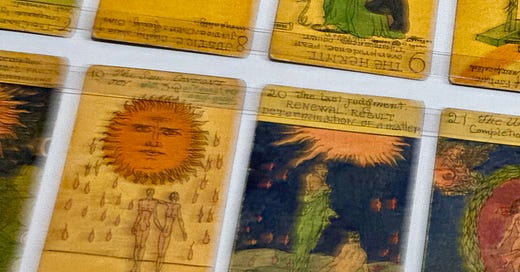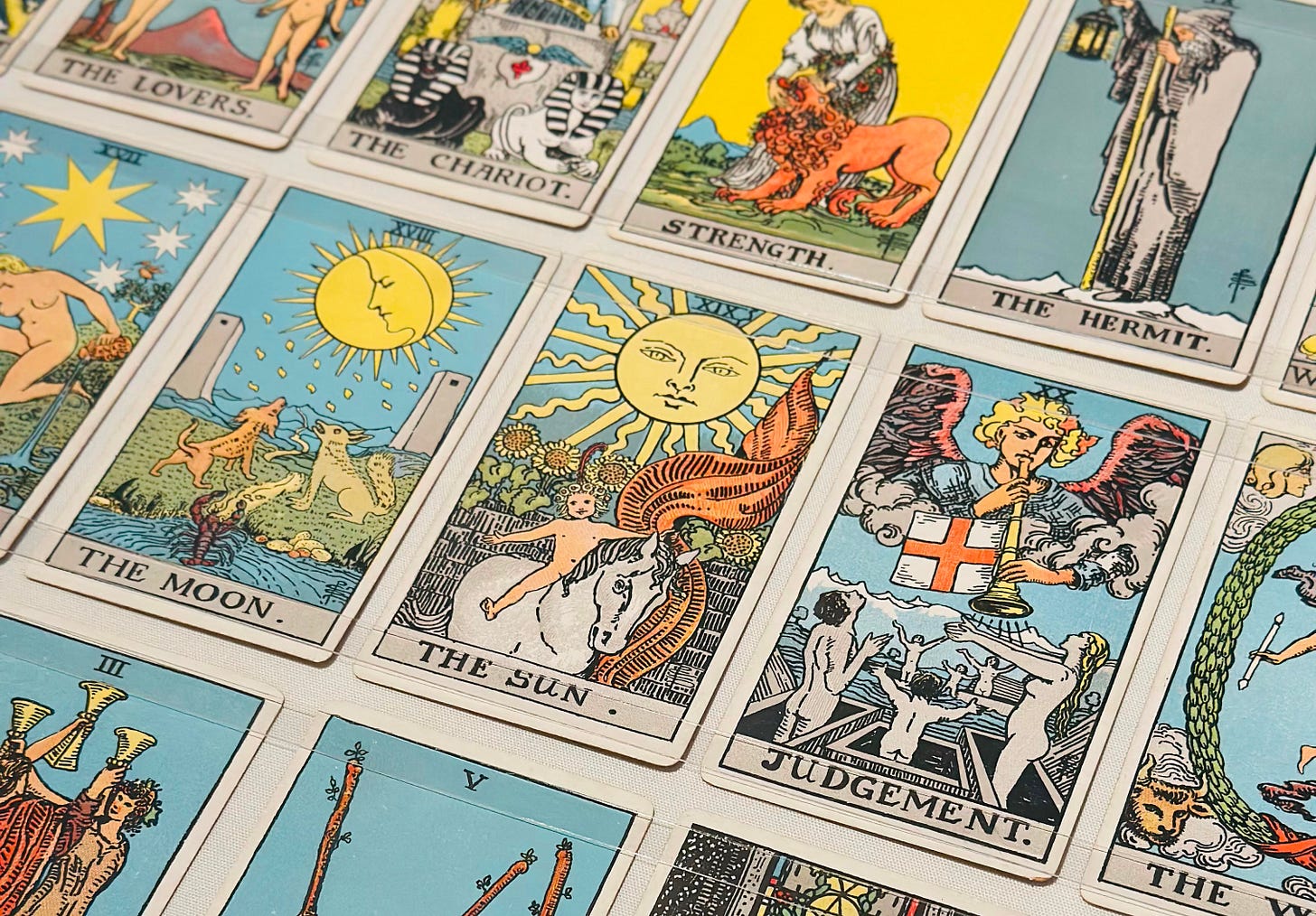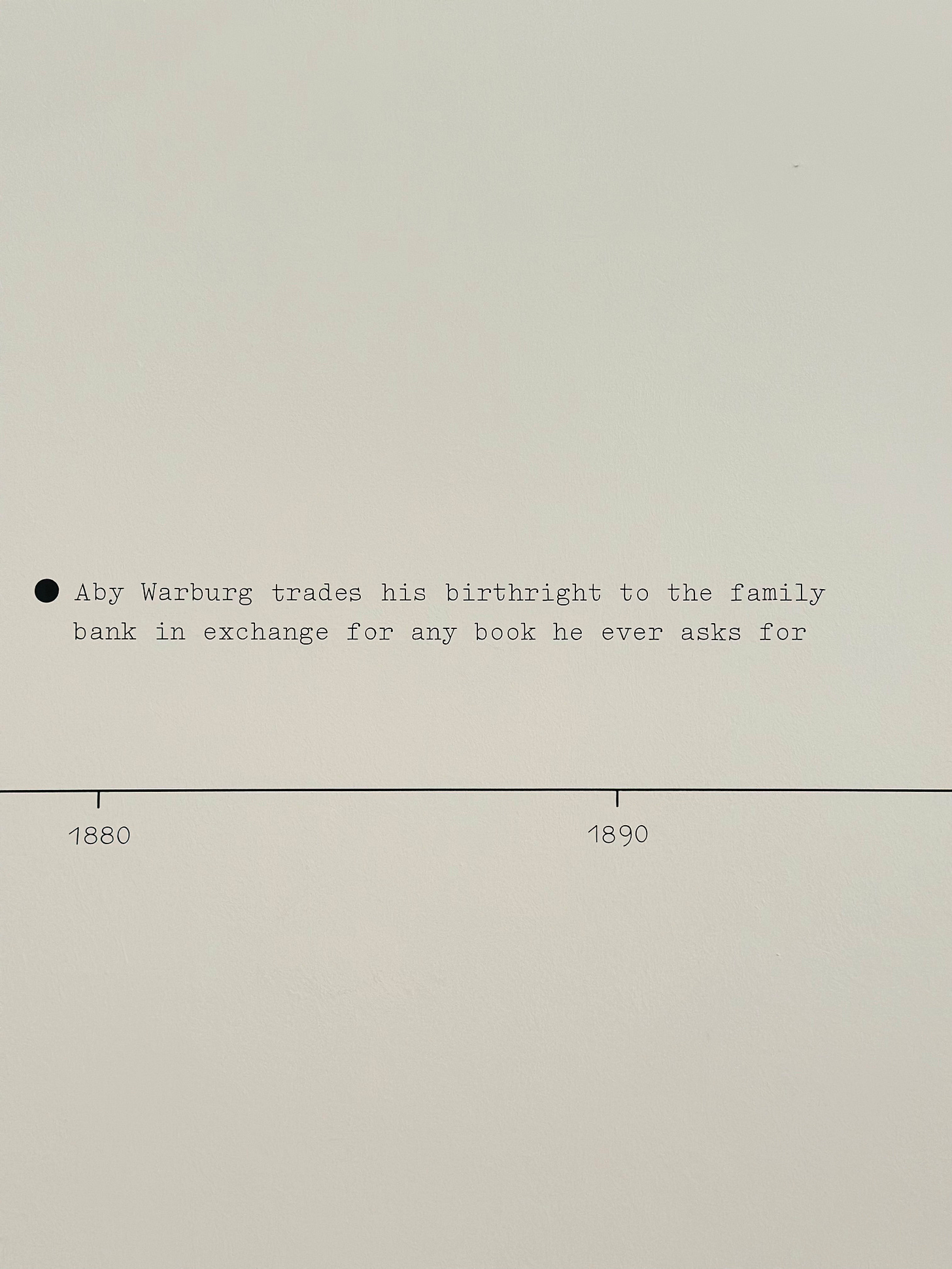I played the self-employed card again this week and made another last-minute dash to an exhibition the day before it ended. This time, it was Tarot: Origins and Afterlife at The Warburg Institute. I’ve had cards on the brain since reminiscing about my creative baby, Fortune Tellus, last week, which swims in the same waters as tarot.
We never really landed on how to describe our card deck when we introduced it to the world. It felt insincere to call it tarot, out of respect for the centuries-old traditions and rituals that come with it. But it’s not as trivial as a card game either. It’s more of a tool, or a compass, somewhere between tarot and journaling prompts, meant to inspire alternative ways of thinking with a refreshingly tactile experience. No scrolling allowed.
Anyone who has engaged with tarot (or played a game of Snap with regular playing cards, to be fair) will know the sensation of having a card revealed to you, facing up, and the split-second intuition of working out what that means.
The exhibition charted tarot’s evolution from the mid-15th century. Maybe it was the hurried Tuesday afternoon energy I brought into the room with me, or I hadn’t read the promo properly, and my expectations were off, but I wasn’t especially taken by the exhibition narrative. I didn’t feel it spoke too much to the Origins of tarot, but read more as a chronicle of card design. Not to diminish the artistry and skill in that alone — I was fully bought into the beautiful interpretations of fortune-telling through the ages, which seems to always have had a power over meaning-seeking individuals.
Like tarot cards themselves, the exhibition left space for interpretation depending on what the viewer was bringing into the experience, and what they wanted to take away from it.
The final installation switched focus to explore the modern-day meaning of tarot, in an age when we’re oversaturated and overstimulated. The explanation on the wall captured the intention we had for our Fortune Tellus deck three years ago, more clearly than we ever managed to:
While these new decks continue to acknowledge the role that chance or fortune plays in human affairs, what may be emerging today is a tarot culture less attached to its occult legacy and more reflective of its ludic and humanist origins – a serious game used to meditate complexity, model resistance and imagine alternative worlds.
“Meditate complexity”. Mmm. Yum.
I brushed against another echo of this idea in a podcast I referenced last week. In his interview with On Being’s Krista Tippett, Justin Vernon meditates on the human instinct of finding meaning in things, like the same numbers that show on the clock each time you glance at it (11:11, 22:22). He explained:
But for me, for real, the one number that always was the thing was 22. And I allowed it to have power, because if it can, you should give it to it and see what it says. It’s like astrology or something like, “Really?” But if you can see a pattern there and it gives you something and it’s real and it does the thing in the body, then it can be very powerful.
This got me thinking about my own framework for intuition, which is that something is in the cards if you believe it’s in the cards.
On my About page, I say I believe in two things: universal timing and trusting one’s gut. I wrote that quite instinctively, didn’t meditate too much on it, but it’s got me wondering about whether these aren’t one and the same thing.
My gut, metaphorically speaking, is my personal interpreter of universal signals. When my gut is seeking meaning, it finds it in the universe. Literally speaking, there is a whole cosmos in our gut. Billions of microbes are digesting, responding, and sending signals back.
My gut is my own intuitive interpreter, and yours is yours.
Whatever way the cards land when they’re flipped over, I’m the one finding the pattern. I’m the one who gives it the power to mean something. Just because I cite an external source (i.e. the universe) doesn’t mean I’ve handed over responsibility. If anything, I deserve a co-author credit.
You, on the other hand, might be someone who puts your faith in the randomness of it all. A belief in the equality of all outcomes. That everything is just as likely as anything else. But that, too, is a belief that you give power to. It’s a compass for finding meaning.
I dip in and out of astrology depending on my mood or my company. Sometimes, it really does bring me comfort to know that the transformational planet Pluto is stationing retrograde in the sign of Aquarius.
I pull a tarot card occasionally, usually only when a friend invites me or we organise a group reading. I don’t have a regular practice myself because I don’t yet have a deck. (Apparently, you’re meant to be gifted your first tarot deck, so let this be a hint to you all.)
But I do see patterns. Everywhere.
I talk to the universe. A lot. I ask her what she’s up to (yes, the universe is a she), what tricks she’s playing at, what’s in the cards for the week ahead.
I let her guide me, but I’m still the one letting her.
It’s a kind of seek-and-ye-shall-find philosophy. Comforting, when you’re in a joyful headspace. Self-sabotaging, when you’re looking for reasons to feel wronged. There’s a yin to every yang.
Whatever cards you’re holding, they’re just prompts. Pay attention to the patterns you’re spotting.
The point isn’t what you draw.
It’s what you choose to give power to.









Loved this one, and though I didn't comment on the original post in which the Fortune Tellus project featured, I enjoyed that one too. I'm a big fan of tarot and reading this has made me want to learn more about it. So you've done your job as a pollinator!